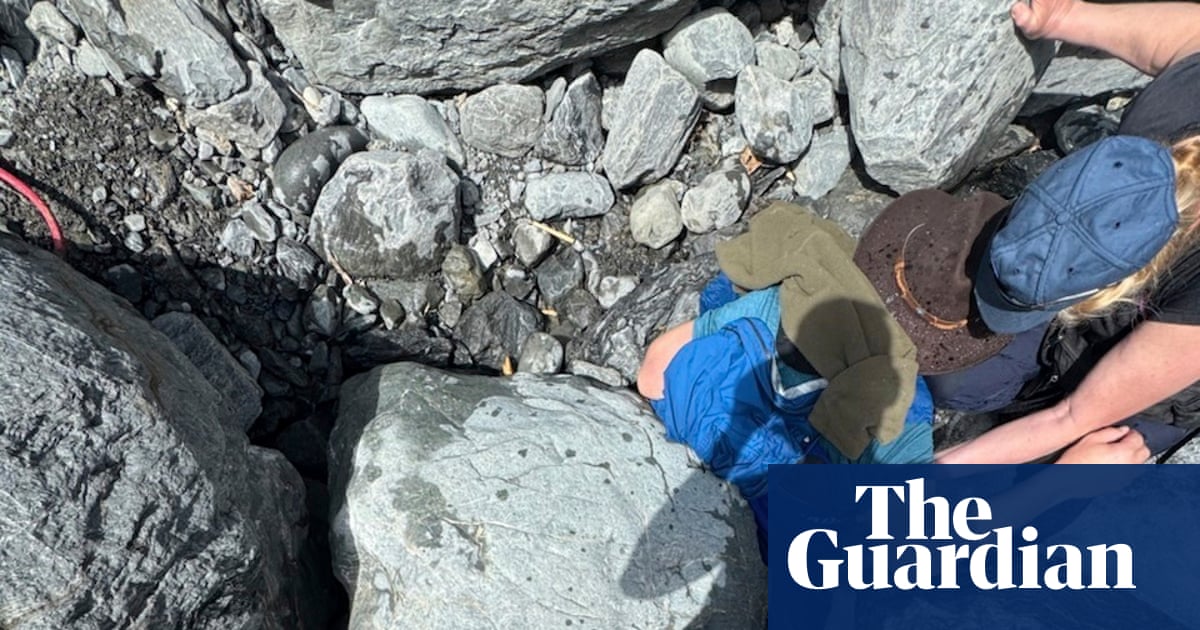AnAlaskaman who was pinned facedown in an icy creek by a 700lb (318kg) boulder for three hours survived the ordeal with only minor injuries, thanks in part to his wife’s quick thinking and lots of luck.
Kell Morris’ wife held his head above water to prevent him from drowning while waiting for rescuers to arrive after Morris was pinned by the boulder, which crashed onto him during a hike near a remote glacier south of Anchorage.
His second stroke of luck came when a sled dog tourism company that operates on the glacier overheard the 911 dispatch and offered up its helicopter to ferry rescuers to the scene, which was inaccessible to all-terrain vehicles.
Once rescuers arrived, it took seven men and inflatable air bags to lift the boulder off as he drifted in and out of consciousness.
Morris, 61, said he realizes he is probably the luckiest man alive. “And luckier that I have such a great wife,” he said Thursday.
His wife, Jo Roop, is a retiredAlaskaState Trooper. They moved to Seward, about 120 miles (193km) south of Anchorage, from Idaho last fall when she took a job with the local police department.
Last Saturday, they wanted to avoid the big crowds that converge on the Kenai Peninsula community during holidays and decided to hike near Godwin Glacier on an isolated and undeveloped trail behind a state prison, said Clinton Crites, the Seward fire chief.
Their trail was actually a rocky creek bed lined with large boulders deposited by the glacier.
Morris said he noticed dangerous boulders, some weighing up to 1,000lbs (454kg), along the banks of the creek and avoided them the best he could, until he ran into an area he couldn’t pass.
“I was coming back and everything, the whole side slid out from under me,” he said.
He said things became a blur as he tumbled down the embankment about 20ft (6 meters), landing face down in the water.
Then he immediately felt the boulder hit his back in what Crites described as “basically an avalanche of boulders”.
The way Morris landed, there were rocks under him, in between his legs and around him that caught the weight of the boulder, preventing him from being crushed, Crites said. But the massive rock still had him pinned, and Morris felt intense pain in his left leg and waited for his femur to snap.
“When it first happened, I was doubtful that there was going to be a good outcome,” Morris said.
His wife tried to free him for about 30 minutes, putting rocks under the boulder and trying to roll it off him, before she left to find a cell signal.
Amazingly, she only had to walk about 300 yards (274 meters) to connect with 911 and relied on her law enforcement experience to send exact GPS coordinates to dispatch.
A volunteer at the neighboring Bear Creek fire department heard the call while working at the sled dog tourism operation and diverted the helicopter used to ferry tourists to the scene. Ultimately, firefighters who couldn’t navigate their all-terrain vehicles over the boulder field jumped out of the helicopter.
By this time, Morris was hypothermic from the cold water running off the glacier, Crites said, and his wife was holding his head out of the water.
“I think if we hadn’t had that private helicopter assist us, it would have taken us at least another 45 minutes to get to him, and I’m not sure he had that much time,” Crites said.
The firefighters used two air bags normally reserved to extract people from wrecked vehicles to slightly lift the boulder.
“But then it just became an all-hands brute force of ‘one, two, three, push,’ ” Crites said. “And seven guys were able to lift it enough to pull the victim out.”
An Alaska national guard helicopter lifted them out of the creek bed with a rescue basket.
Morris spent two nights at the local hospital for observation but walked away unscathed.
“I fully anticipated a body recovery, not him walking away without a scratch on him,” Crites said.
Morris, who is now reflecting on his ordeal at home, acknowledged it might have been a little wake-up call to stop doing things like this at his age.
“I was very lucky. God was looking out for me,” he said.
When he and his wife go hiking this weekend, they are going to stick to established trails.
“We’re going to stop the trailblazing,” he said.
